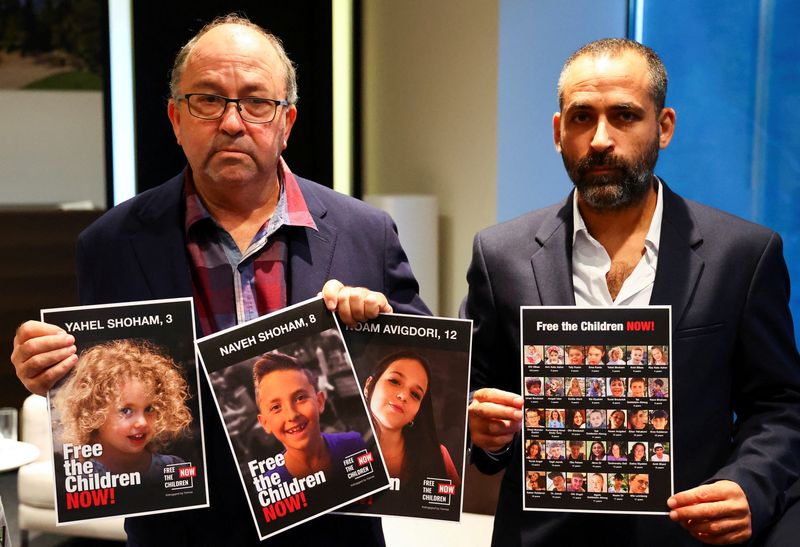By Janis Laizans
KIBBUTZ GVULOT, Israel (Reuters) – Exhausted by weeks of worry and vigils, Gilad Korngold drew just a measure of comfort from the foreign-mediated deal between Israel and Hamas to return some hostages held in the Gaza Strip.
He still awaits word that any of his seven relatives, including his three-year-old granddaughter, who were seized by Palestinian gunmen during an Oct 7 killing spree in south Israel, are named on the list of 50 women and children slated to go free, possibly as soon as Thursday.
Korngold’s son, Tal, would presumably not qualify. His daughter-in-law Adi and grandchildren Nave and Yahel presumably would, as would Adi’s mother Shoshan, her aunt Sharon and her niece Noam. But there is no guarantee of their inclusion.
Nor is their health condition or location clear. Hamas has said that dozens of the around 240 hostages have been killed during Israel’s Gaza counter-offensive. Some of the hostages are held by Palestinian groups other than Hamas, though it governs Gaza.
“We need to know they are alive, if they’re okay. It’s the minimum,” 63-year-old Korngold said in the temporary home to which he moved after his nearby village was ravaged by Hamas.
“I want everybody back. But I think – and it’s a very tough decision – but I think the children and women must be (first). they’re most fragile. You know, they need to get out.”
Such sentiments have been echoed by family members of some of the other Israelis likely to be left out of the current deal, under which the Gaza war will be suspended for four days, and 150 Palestinian security prisoners freed. The 50 recovered hostages would represent around half of women and children held.
Israel has offered to extend the pause in fighting further – a day for every additional 10 hostages handed over. But, for now, not even the first release roster has been made public.
Korngold, another three of whose relatives were killed outright by the Hamas marauders, has been campaigning daily to promote the hostage issue in Israel and abroad. The stress means he struggles to rest.
“I need to take sleeping pills. Strong ones, so (I get) at least four or five hours of sleep. If not, I can’t handle it,” he said.
“Nobody can imagine how we feel. Imagine that your kid instead of sleeping in the bed with a blanket … is underground, deep, in deep tunnels. She’s three years old, my girl, my granddaughter.”
So far just five hostages have been recovered alive. One of them said Hamas had held her, and two-dozen others, in a buried warren of tunnels. Those secret passages, which serve as subterranean Hamas citadels, are a focus of Israel’s heavy military strikes.
As part of the hostage deal, Israel agreed to allow more humanitarian aid, and some fuel, into the besieged Gaza Strip. Korngold chafed at that idea as long as the most vulnerable of hostages remained in captivity.
“We ask: Release the children and the women at once. It’s impossible to bargain with children,” he said. “No food, no gasoline, no diesel, nothing. Children and women must be released immediately.”
(Writing by Dan Williams; Editing by Alexandra Hudson)
